Composer Pauline Oliveros
A Conversation with Bruce Duffie
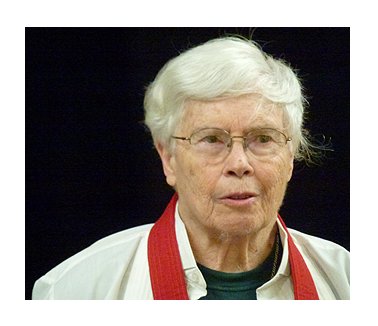
PAULINE OLIVEROS is a senior
figure in contemporary American music. Her career spans fifty
years of boundary dissolving music making. In the '50s she was
part of a circle of iconoclastic composers, artists, poets gathered
together in San Francisco. Recently awarded the John Cage award for
2012 from the Foundation of Contemporary Arts, Oliveros is
Distinguished Research Professor of Music at Rensselaer Polytechnic
Institute, Troy, NY, and Darius Milhaud Artist-in-Residence at Mills
College. Oliveros has been as interested in finding new sounds as
in finding new uses for old ones. Her primary instrument is the
accordion, an unexpected visitor perhaps to musical cutting edge, but
one which she approaches in much the same way that a Zen musician might
approach the Japanese shakuhachi. Pauline Oliveros' life as a
composer, performer and humanitarian is about opening her own and
others' sensibilities to the universe and facets of sounds. Since
the 1960's she has influenced American music profoundly through her
work with improvisation, meditation, electronic music, myth and
ritual. Pauline Oliveros is the founder of "Deep Listening,"
which comes from her childhood fascination with sounds and from her
works in concert music with composition, improvisation and
electro-acoustics. She describes Deep Listening as a way of
listening in every possible way to everything possible to hear no
matter what you are doing. Such intense listening includes the
sounds of daily life, of nature, of one's own thoughts as well as
musical sounds. "Deep Listening is my life practice," she explains,
simply. Oliveros is founder of Deep Listening Institute, formerly
Pauline Oliveros Foundation.
|
This conversation took place in 1996, just as the use of the internet
was beginning to gain the universality that we take for granted
today. Being a forward-looking individual, Oliveros was already
working with this, and we address the phenomenon early in the
conversation. During our pre-interview chit-chat, she spoke
of an event the Deep Listening Band recently had accomplished with
Oliveros in Chicago, Stuart Dempster in
Seattle and David Gamper in New York which was done through PictureTel,
a brand of videoconferencing software, and ISDN lines. I
mentioned my admiration for Dempster and his rendition of General Speech by her teacher,
Robert Erickson, and that I often played his Oceans on the radio. [See my Interview with Robert
Erickson.]
We begin with her eponymous project . . . . .
Bruce Duffie: Tell
me about the Pauline Oliveros Foundation which is having its ten-year
celebration. [The Pauline Oliveros Foundation
was established in 1985 and officially incorporated as The Pauline
Oliveros Foundation, Inc. in 1986. In 2005 it became the Deep
Listening Institute, Ltd.]
Pauline Oliveros:
It's a nonprofit organization, and it's a
program for the arts.
BD: All the arts?
PO: Yes. The
mission of the foundation is the creation of new
work in a new medium for artists and collaborations, with dissemination
via our mail order
catalog through presentation and education of the public
about new work. It's different from traditional organizations in
that that's our focus. Artists very much need a platform and a
community. In 1960 I was involved the founding of the San
Francisco Tape Music
Center, and that organization really is one of the first, or a
prototype alternative organization for composers
needing a place to work. At that time it was electronic music,
which
had no platform at all.
BD: Have you tried
to get other electronic
composers involved in this, or composers of all kinds?
PO: You don't have
to be categorized. Technology is part of our mission, as well as
supporting other
projects, but you don't have to be a "this" or a "that." You need
to work on projects that
are breaking new ground.
BD: With all the
time that you are promoting this new foundation, are you still
composing yourself?
PO: Yes, that's
right.
BD: How do you
divide your time amongst all these taxing
activities?
PO: [Takes a
breath, then speaks with honest, resigned
bafflement] Well, I don't know. [Laughs] It seems to
be a call. As I said, the San Francisco Tape Music Center was
very important to me as a young composer, and it
gave me a platform and a place to launch my work. I don't know
where I would've been at home without
that. As I have gone through several decades
of creative activity, I felt that it was important to resign from my
university job and to create my own organization, to do just that.
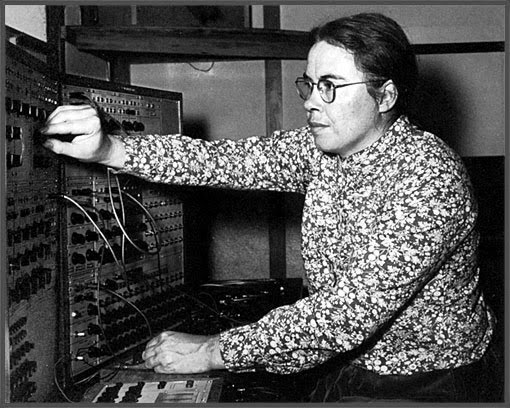 BD: Are you creating
your own little university?
BD: Are you creating
your own little university?
PO: I don't think
of it as a
university! I think of it as
community.
BD: So then you're
more of an impresario?
PO: No, I don't
think of myself as an impresario, really.
BD: I'm sorry that
I seem to be
trying to find a pigeonhole for you.
PO: I know!
There really isn't one, and I
keep trying to jump out of those pigeonholes because I feel
that the kind of context that we need keeps changing. As soon as
you get comfortable in a category, it starts to lose its charge and its
vitality. It also just doesn't really deal with the issues that
are
at hand.
BD: So what are
the issues that are currently at hand?
PO: It's the
great dispersion that I predicted in my book Software for People, which was that
the two factors were the great increase in population — there
more people than there ever have been before — and
the acceleration of new technology. You really don't know what's
coming next,
exactly. Everyone is always trying
to predict and control the future, but I don't think it's possible at
this time because there are
just too many X factors.
BD: So you and
your foundation and your music are building
the future brick by brick?
PO: Yeah, I would
say something like that; or we might take some leaps! But the
idea is that we need a context for new work,
because it has to do with the quality of
life. It has to do with problem solving, understanding the
creative nature of the human being, and working with it and accepting
it; finding ways to do that. Not just repeating things that
have been done before, but to bring some kind of balance in place for
the unknown.
BD: Is it at all
disappointing that the public isn't craving the
unknown in music?
PO: The public is,
but they don't necessarily
know it! [Laughs]
BD: There seems to
be less of a
clamor for new music than, say, for new cuisine or new films.
PO: Music has been
a
very conservative force, and the reason, I
think, for it is that people have not been given the opportunity or
encouraged or catalyzed to make their own music. The issue is
making music creatively, creating one's
own kind of music out of whatever materials there are and
whatever needs there are. You find that in pockets, but in
establishment music schools,
what do you find? You find people learning how to
play instruments to perform music of the past for
the most part.
BD: [With a gentle
nudge] You're not suggesting that we lose the past, are you???
PO: No! But
why do
we have to do it so much?!!
BD: So you want
the past in conjunction with the present and the
future?
PO: Yes,
exactly. Let's have some balance!! Why do we have to have
all these
repetitions? There is no opportunity for creative work by
musicians... or very little.
BD: Even with very
little opportunity, are you encouraged by what creativity is
going on these days?
PO: Yes. I
think that there is quite a bit. But still, if you look in the
newspaper or listen to the radio stations, what do you hear? What
do you see? Where are the
results? Where is it made available? Where are
people educated about it and given opportunities and support?
*
* *
* *
BD: When you're
writing a piece of music, are you concerned
with the public that is going to hear it, or are you concerned with the
sounds that you are producing for yourself and for other
composers? What goes through your mind?
PO: It depends on
the situation. A
lot of my work in the past 25 years has been concerned with forms that
invite participation by all kinds of people. So if you ask me
whether I'm concerned about the audience or the sounds, I'm
concerned about both! Also I'm concerned that it be possible to
give an audience not
only some sounds or some guidelines to work with, but really an
experience that is
undeniable!
BD: We're dancing
around the question, so let me hit directly. What is the purpose
of music?
PO: I always liked
John Cage's answer to
that, which is to open the mind to divine influences. That's a
good one, but I do think that music is a
vehicle for the expression of the soul. It has lots of different
functions. We think of
music in this society as entertainment, which it very
well may be. There's nothing wrong with entertainment, and good
entertainment at that, but it can have other purposes. It
can function as a healing force; it can function as a way of journeying
inside and finding out something about oneself; it can be an
intellectual game; it can bring
emotional support to people who need it; it can help in
therapeutic ways; it can just be itself, it can just be
music!
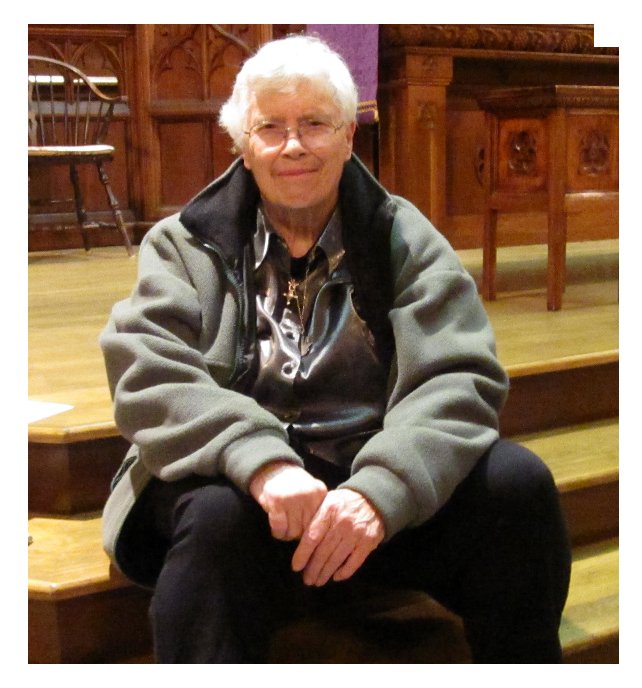 BD: Music for its own
sake?
BD: Music for its own
sake?
PO: Yes, I guess
you'd say.
BD: Or is it music
for people's sake?
PO: Music and
people go together;
they are not separate. How could it be?
BD: Like the tree
falling in forest if
no one is around, if a work is performed and there's
no audience, is it music?
PO: If there's a
performer then there's an audience.
BD: I see, an
inward audience.
PO: Sure! Of
course!
BD: But I would
assume that mostly you would want an
outward audience, also.
PO: Not
necessarily. It depends on the use
of the music. There's plenty of music that's played
only for the person who's playing it! And why not? A large
audience comes out of this
19th century grandeur. It wasn't always so.
BD: As a composer,
would you not like your music to be
heard by as many people as possible?
PO: Sometimes it's
more powerful for music to be heard by a few
people, and then to have that situation happen
often is very nice, but then you have more people. Sometimes
it's possible to work with a large audience, but the larger the
audience the less the detail in the reception of the work.
BD: Before the
tape machine was running, you mentioned that you're now going
on the World Wide Web. Is this the ultimate in individual
audiences, to have music for each individual computer
user?
PO: I don't think
about ultimates. I think that this is very interesting
tool, a wonderful tool to be able to communicate with to get a
message out to many, many people. In this case, numerous people
is a
very interesting thing. This
represents a new means of distribution of work, as the fiber-optic
system comes around. When we see the replacement of copper wires
with
fiber-optics, then you can send CD-quality sound. It would be
possible for people to download something of real quality. Right
now it's what we call "low-res", low resolution. So it's not
necessarily very high quality. But I think of things happening
through the Internet. There are various difficulties like delays,
and the method
of data transfer now, which is packets, doesn't go too well with
musical continuity. So there are
different kinds of things that need to be addressed in the
technology before it has that [snaps fingers] snap to it.
[Laughter]
BD: So you're
wanting to get the same impact in cyberspace that you would in a
live performance?
PO: The same
impact in cyberspace as in real space? [Ponders a moment] I
don't know for sure because the impact in real space is
different according to the real space and who is there and what is
being performed. There are so many variables and factors to take
into
account.
BD: Is this
something that you could build in to your
music? Could you program it with the idea that you could select a
known concert hall in San Francisco or
in Chicago, or an unknown space at the top of a mountain in Colorado?
PO: That's a
beautiful idea, and data structures already exist for those kinds of
possibilities. I have a
great interest in these different spaces.
BD: In the print
medium you can
select your background. Now in the aural medium, you can also
select
your background.
PO: I don't
exactly think of
it as background, just to point this out. I'm thinking all
the time of the space that I'm performing in as the partner in the
music. That's very important to me, so that's why I picked up
on your idea right away. That's essential. You've been
working in radio space for a long time, so when you play music on the
radio,
what are you thinking about in terms of how it's being received out
there?
BD: I know that
it's going to be received differently by
someone listening on a small radio in a bedroom, or on a large radio in
a living
room, or in a bigger set that was perhaps a gathering of many people at
a party. Each system is different and the room
is going to be different.
PO: Exactly.
So it's a very, very interesting
situation. You send it out, but the reception of it is going to
be different for each of the maybe
thousands of people tuned in at the same time! I wonder what it
would sound like if you could hear that all at once... [Both
laugh] I grew up in radio land. Hearing music on the radio
was extremely important to me all my life. Hearing the New York
Philharmonic and the NBC Orchestra with Toscanini, and the Metropolitan
Opera, and all of that. It was a huge part of my education!
BD: When you're
composing a piece, would you specifically
design it differently if you knew it was only going to be performed
through loudspeakers rather than
with live people in a concert hall setting?
PO: Certainly, I
would. I would try to take
as much into account as possible about the way something was
going to be presented. Here we are at the end
of the 20th century, with all these means of transmission and
performance, and it's a little bit mindboggling when you start to think
of the ramifications of it and the different cultures of it. By
that I don't mean different geographical locations; I'm meaning
just a person who is of the culture of radio or of television or of the
concert hall, or of car radio. All
these represent to me different cultures.
BD: Do you expect
a certain
level of sophistication on the part of your listeners, or does it
matter to you?
PO: That
depends. If they have no reference
points, then it could be pretty hard at times.
BD: So is your
music for everyone?
PO: No! It
doesn't seem to be. [Bursts out laughing] Otherwise, I
would be as popular as Bruce Springsteen or The Smashing
Pumpkins. [Both ponder that idea for a moment] I seem to
have a reputation, to be
known by people in a network throughout the world, but it isn't the
network of everybody.
BD: Would you want
it to be everybody?
PO: If everyone
could participate and appreciate it, yes I would. If it were
beneficial for everyone to appreciate it and
participate in it, I would like that.
*
* *
* *
BD: Is all of your
music either
notated or placed on the electronic spectrum, or is some of it left to
chance as in the Cage music?
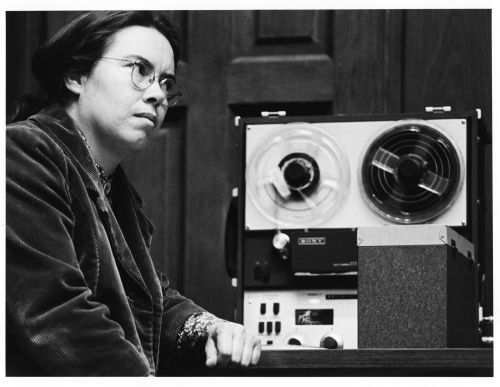 PO: I've been at it now
for 45 years, so there's a lot of different resources that I use.
Again, it refuses to get too
categorized because it'll change!
PO: I've been at it now
for 45 years, so there's a lot of different resources that I use.
Again, it refuses to get too
categorized because it'll change!
BD: That means you
are looking to do different
things all the time.
PO: Yeah, I
am. I am looking do that, and to change myself
through the process of change.
BD: Is it change
to improve or just change for change's sake?
PO: It's change to
deal with the issues and conditions that are
met.
BD: Do you change
as the world changes?
PO: I don't know
if I could say that or not!
BD: If you
write a piece for a certain time, does that get lost when the time
moves on?
PO: I have some
pieces that are obsolete! [Laughs] I mean "obsolete"
in the sense that it uses referential sounds and things that are no
longer very present in this culture!
BD: But at least
some of us still have that history
within us.
PO: Yeah, well
sure! But the younger people don't! For example, in one
piece that I wrote in about
1964 called Pieces of Eight
was a theater
piece for eight wind instruments, and it had a lot of props in
it. Some of the props were a little on the antique side at
the time, including a weather vane and a balance scale and particularly
a cash register.
BD: [Imitates the
sound of an old mechanical cash
register] Ka-chunk!
PO:
Ka-chunk! Bing! [Both laugh heartily] You don't have
those any more except in a very rare specialty shop.
BD: Should you do
a new version of that with a modern scanner?
PO: That's not the
same! The culture of that piece needs to
stay there and not be revised and updated into this
particular time.
BD: Is there,
perhaps, a direct relationship with dialing a rotary phone [imitates
the sound of
dialing a rotary telephone]
shoo-oo--WHEE--tick--tick--tick--tick, and how it would be now with a
touch-tone [imitates the rapid-fire sound of a touch-tone
telephone] bee-ba-buh-buh-buh-ba-beep?
PO: That's
right. Each player had a wind-up alarm clock they would ring, but
it was a mechanical alarm clock, not an electric one that would
beep! [Laughs] All of those
things are references to a former time!
BD: Shouldn't we
enjoy that now?
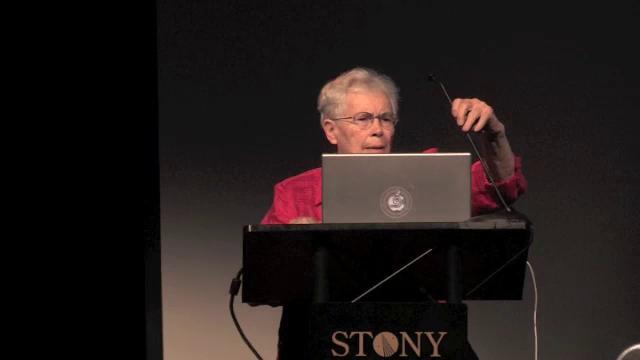 PO: I think it could and
it can be done. You could
enjoy it to hear the sounds and get the fun of the references,
probably, but young people who have no experience
with any of those things might be a bit curious.
PO: I think it could and
it can be done. You could
enjoy it to hear the sounds and get the fun of the references,
probably, but young people who have no experience
with any of those things might be a bit curious.
BD: But we're all
presumably taught
history in school. If we know the history of this century we know
World
War I, the Depression, FDR and Harry Truman and all of this right up to
today.
PO: It's
interesting that these things in
the '60s had a referential meaning that at this time would be somewhat
different. So I say it's obsolete in a sense.
BD: But it
wouldn't be obsolete like a political reference
to Nixon's dog Checkers, or something like that.
PO: No, It
wouldn't. It was actually kind of
a piece that was my way of dealing with conductors. As my music
evolved over the past 20 or 30 years, I've made a lot of pieces that
dispense with conductors! This theater was a kind of spoof on
conductors, who they are, what
they do and how they function!
BD: When you get
rid of the conductor are you then expecting
more out of the performer, or are you just cutting them loose?
PO: I'm expecting
the performer to be responsible and
accountable for their part!
BD: Are they
responsible for recreating what you have written,
or are they responsible for putting their own input into it also?
PO: In my work,
what is involved is a partnership with
the performer, which gives the
performer creative decision making possibilities.
BD: Within
parameters, or without parameters?
PO: With
guidelines.
BD: How tough are
the guidelines?
PO: Tough
enough. They seem very simple, but they are very deceptive in
terms
of the simplicity. As an illustration, I have a piece that's
called The Witness. [The Witness (1980), for soloist and
an imaginary partner or ensemble of
up to 100.] It has three options in it that have to be
developed over time in the piece. The first option is that the
player is free to make any sound, but each succeeding sound has to be
absolutely unique
and different from any of the sounds that preceded it. So that's
a simple instruction.
BD: That
guarantees that each performance will be
unique into itself!
PO: Of course, but
more to the point is the fact that the performer is confronted
with a very complex problem to solve, and is free to solve it however
he or she can! You make a sound; the next sound has to be
different and it has to be unique! Not the same sound that was
made before, and not related
to the sounds that were made before when you have moved in time.
It may be that ten minutes
go by and you hear three sounds if it's done correctly. Then
there is another
section to the piece with another instruction and another, so it's
actually quite demanding of the performer. But also it's a
partnership in
terms of their creative work.
BD: It sounds like
you expect a lot of your performers.
PO: Absolutely!
BD: Should you be
listed as composer, or just "guider" or
"leader."
PO: I don't
care! [Laughs] I'm gettin' so I don't care whether it's
"composer" or not. It's another label. What is a composer
anyhow?
BD: Let me turn
the question back to you. What is a composer?
PO: There are all
kinds of definitions, but I think a composer organizes the sound in the
piece, or organizes
the events, maybe. There's all kinds of different
ways that you can approach it, but what I'm organizing is the strategy
and the way that the performer is asked to direct
attention or manage attention. This is a different level of
understanding, in terms of creating a piece of music.
*
* *
* *
BD: Have you
basically been pleased with the performances of your works that you've
heard over the years?
PO: [Takes a deep
breath] Not always, no. Sometimes I'm
very displeased, and say so! I'm displeased if the instructions
or
guidelines that I give are disregarded! Then it's not
my piece; it's somebody else's piece, and that's okay, but I would
rather that my piece be
withdrawn and that person goes ahead and makes their own piece
and calls it theirs.
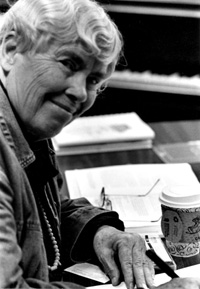 BD: In terms of
disregarding your instructions, how far is too far?
BD: In terms of
disregarding your instructions, how far is too far?
PO: Suppose you
gave a piece which was in conventional pitch-rhythm
notation, and the performer looked at it and said, "I think I'll
play some other notes here and play a different
rhythm there." It's the same thing!
BD: Sure!
But in your
pieces you are allowing much more freedom of interpretation
and input from the performers!
PO: Not
really.
BD: [Very
surprised] Oh???
PO:
[Chuckles] There still is room for interpretation. They
have to interpret the work. They have to interpret the pitch and
the rhythm, but there is a common practice that is agreed upon.
There is a
performance practice that is inherent in the work that I've done and
do, and that probably has
to be transmitted by me to the performer. Later, if
performers have got it — and
there are certainly performers who have learned my performance
practice — then they can transmit it, too.
But this is
true of any music anywhere in the world. It doesn't matter
whether it's written in notes or transmitted orally, or what.
BD: Can one assume
that you're basically pleased with the
recordings that have been made, especially since you've supervised some
of them?
PO: Pretty much,
yeah.
PO: A lot of the
current
recordings I'm
performing myself.
BD: So they take
on an air of authenticity?
PO: I hope
so. [Laughs]
BD: Does that in
any way put straitjacket on future
performances of them?
PO: Not
necessarily, because other performances would be
different, probably.
BD: What about 100
years from now when someone says, "But Pauline was on
this recording, and that's how she did it. We must do it that
way"?
PO: Too bad.
[Much laughter] I hope 100 years from now there will
be something else going on.
BD: You don't want
your music to last???
PO: I don't know
if it's necessary for that to happen.
BD: Do you want it
to disappear, or be only in
a history book on the shelf?
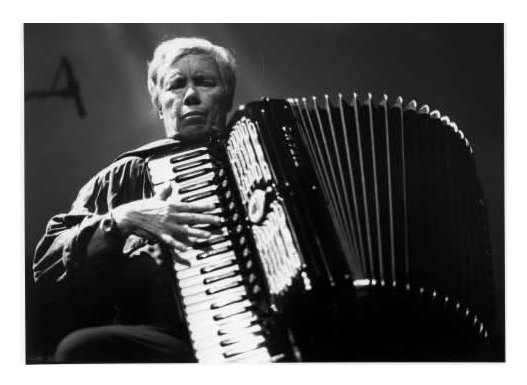 PO: No, I would rather
that the principles and essences of the
kind of practice that I have shown would be what is transmitted and
appears later, not
necessarily the notes.
PO: No, I would rather
that the principles and essences of the
kind of practice that I have shown would be what is transmitted and
appears later, not
necessarily the notes.
BD: So you want to
be built upon.
PO: Sure!
I'm hoping that this is a kind of seed-like work that brings about
discovery and exploration in other people,
not necessarily the preservation of a sequence of notes that I might've
put down.
BD: Are you
optimistic about the future of music?
PO: Music is very
resilient! Music will be! It'll
always be there, one way or another.
BD: What advice do
you have for composers coming along?
PO:
[Matter-of-factly] Listen!
BD: To what?
PO:
Everything. Listen to everything, even the smallest, faintest
sounds. Listen to sounds, listen to
music, listen to everything — the environment,
everything that's
going on.
BD: So then, as
Cage said, everything is music.
PO: It is, if
you're listening to it that
way. But if you're not
bringing your consciousness and identifying it as music, it's not!
BD: So if someone
is swinging a hammer and pounding a nail, it might not be music to
them, but if I'm listening to it
for the rhythm and for the sound of the hammer hitting the nail, it
can be music.
PO: Of
course! Why not?
BD: So beauty is
in the eye of the beholder, and music is in the
ear of the beholder?
PO: Music is in
the ear of the listener! It has to be.
BD: What advice do
you have for audiences?
PO: Again, it's
about
listening. [Pauses a moment] It's about letting go of
whatever baggage you bring with you. If you go
and hear Mozart and you're a fan of Mozart, then you should go
with your Mozart ears and listen that way to get pleasure of that way
of listening. But if
you're going to hear something that is a new work, then it's
good to go like a baby — open and ready to hear
whatever's coming at you!
BD: Is composing
fun?
PO: [Thinks for a
moment] Yes, it's
fun, but not always. You might
have a pretty tricky problem to solve, and it
takes a lot of thinking; it's elusive and you have to come back
to it. That's not necessarily not fun. Sometimes
if you're wanting to get something done and the
solutions are not coming as quickly as you would like, that's not so
much fun. But that just has to do with
patience.
BD: Eventually are
you able to solve everything?
PO: [Thinks again
for a moment] Let's
say that I go towards that. I go in that direction if
possible.
BD: Is that,
perhaps, an unfair question because you
are the one who is posing the problems?
PO: I guess mostly
that's true, but sometimes
you're asked to do things by others, so they are then proposing some
problems for you, too.
BD: Thank you for
coming and sharing everything. I appreciate being able to speak
with you today.
PO: You're
welcome. Thank you for coming here and doing this. I
appreciate it.
===
=== === === ===
=== ===
------- ------- -------
=== === === ===
=== === ===
© 1996 Bruce Duffie
This interview was recorded in Evanston, IL, on
April 15, 1996.
Portions (along with recordings)
were used on WNIB in 1997, and on WNUR in 2003 and 2008. This
transcription was
made and posted on this
website in 2012.
To see a full list (with links) of interviews which have been
transcribed and posted on this website, click here.
Award
- winning
broadcaster Bruce Duffie was with WNIB, Classical 97 in Chicago
from 1975 until its final moment as a classical station in February of
2001. His interviews have also appeared in various magazines and
journals since 1980, and he now continues his broadcast series on WNUR-FM,
as well as on Contemporary Classical Internet Radio.
You are invited to visit his website
for more information about his work, including selected transcripts of
other interviews, plus a full list of his guests. He would also
like
to call your attention to the photos and information about his
grandfather, who was a pioneer in the automotive field more than a
century ago. You may also send him E-Mail
with comments, questions and suggestions.


 BD: Are you creating
your own little university?
BD: Are you creating
your own little university? BD: Music for its own
sake?
BD: Music for its own
sake? PO: I've been at it now
for 45 years, so there's a lot of different resources that I use.
Again, it refuses to get too
categorized because it'll change!
PO: I've been at it now
for 45 years, so there's a lot of different resources that I use.
Again, it refuses to get too
categorized because it'll change! PO: I think it could and
it can be done. You could
enjoy it to hear the sounds and get the fun of the references,
probably, but young people who have no experience
with any of those things might be a bit curious.
PO: I think it could and
it can be done. You could
enjoy it to hear the sounds and get the fun of the references,
probably, but young people who have no experience
with any of those things might be a bit curious. BD: In terms of
disregarding your instructions, how far is too far?
BD: In terms of
disregarding your instructions, how far is too far?  PO: No, I would rather
that the principles and essences of the
kind of practice that I have shown would be what is transmitted and
appears later, not
necessarily the notes.
PO: No, I would rather
that the principles and essences of the
kind of practice that I have shown would be what is transmitted and
appears later, not
necessarily the notes.